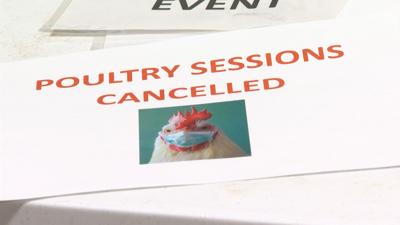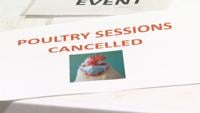DELMARVA -- Delaware kicked off its annual agricultural week Monday without poultry sessions due to avian flu concerns. Some poultry farmers, and others within the peninsula's agricultural industry, expressed their concern over recent reported cases.
Farmers at the event told WBOC that many poultry growers decided against showing up to the event out of caution for their flocks. Those that did said they were taking all necessary precautions.
Georgie Cartanza was the original session lead for Monday's planned poultry sessions. Cartanza works with the University of Delaware as a poultry extension agent and has a poultry farm in Delaware.
Cartanza said losing a flock to avian flu can be devastating.
"There's a potential that you could go unpaid for multiple months," Cartanza said.
According to Cartanza, it's vital that growers take necessary precautions to protect their flocks. Some recommendations Cartanza gave included limiting wild animals around the chicken houses and wearing specific, sterile clothing for each chicken house.
"I can not stress enough having that line of separation between the outside world and where the birds are present," Cartanza said.
Jim Minner is the president of the Kent County chapter of the Delaware Farm Bureau. Minner said the latest outbreak has caused him some concern.
"If it hits us hard, it could actually wipe out farming in this part of the country," Minner said.
According to Minner, the risks associated with avian flu affect more than just poultry farmers.
"It also affects those of us who supply the crops to those growers," Minner said. "If they don't have a need, the prices are gonna fall like a rock. There's nothing here other than poultry to hold up the industry."
Delaware Secretary of Agriculture Michael Scuse said there have been three recent outbreaks in commercial flocks; one in Maryland, and two in Delaware. According to Scuse, state officials are taking all necessary precautions.
"We have three flocks. But when you look at the number of flocks here on the peninsula, it's an extremely small percentage," Scuse said. "But we don't want it to get anymore either."
Scuse told WBOC Monday that the number of migratory birds around the peninsula is likely related to the recent transmissions.
"I think we're probably the hot zone in the United States right now for HPAI with the number of migratory birds and the number of dead migratory birds that we're finding throughout the peninsula," Scuse said.
Scuse said that, if growers are affected by the virus, they won't have to deal with the consequences alone.
"If the worst happens, Delaware, Maryland, the USDA and the companies are there to help," Scuse said.
According to Scuse, any poultry farms affected by avian flu are being properly treated and quarantined to prevent further spread.



